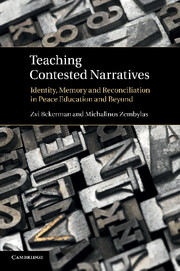Book contents
- Frontmatter
- Contents
- Acknowledgments
- Permissions
- Part I Introduction and theoretical underpinnings
- Part II Living and teaching contested narratives
- 4 Victims and perpetrators
- 5 (Im)possible openings
- 6 The everyday challenges of teaching children from conflicting groups
- 7 The emotional complexities of teaching contested narratives
- Part III Mourning, forgiveness and reconciliation
- Part IV Conclusions
- References
- Index
4 - Victims and perpetrators
How teachers live with contested narratives
Published online by Cambridge University Press: 05 December 2011
- Frontmatter
- Contents
- Acknowledgments
- Permissions
- Part I Introduction and theoretical underpinnings
- Part II Living and teaching contested narratives
- 4 Victims and perpetrators
- 5 (Im)possible openings
- 6 The everyday challenges of teaching children from conflicting groups
- 7 The emotional complexities of teaching contested narratives
- Part III Mourning, forgiveness and reconciliation
- Part IV Conclusions
- References
- Index
Summary
In this and the following chapter we want to show in detail some of the mechanisms as well as the paralyzing implications of the perpetrator–victim narratives in the context of in-service training sessions of Jewish and Palestinian-Israeli teachers who teach in Palestinian-Jewish integrated schools. As noted previously, the choice of teachers and context reflects only the data we have available; there is nothing special about these teachers regarding the issues we raise, and they are as special as any other adults in societies suffering from intractable conflicts. Our experience and some other works published on intergroup encounters show adolescents and adults behaving and arguing in similar ways (see Maoz et al., 2007).
Background on teachers’ workshops
The teachers’ workshops discussed in this chapter were designed as a sphere of activity and learning that would enable primary school teachers teaching in the Palestinian-Jewish integrated schools to analyze and systematically develop innovative school curricular activities. These activities aimed at attending to issues of cultural/religious/ethnic identity while creating and supporting social cohesion and inclusion within the framework of a civil society. The ultimate goal of these efforts was to allow participating teachers to seriously consider the challenge of implementing educational practices that could sustain a substantive multicultural educational policy rather than merely paying lip service to equality. Research-wise, the idea was to record all teacher activities in order to allow us, upon analysis, to better understand the intricate issues that teachers from different religious/ethnic/national backgrounds have to confront when jointly working in integrated educational initiatives in societies suffering from intractable conflict.
- Type
- Chapter
- Information
- Teaching Contested NarrativesIdentity, Memory and Reconciliation in Peace Education and Beyond, pp. 71 - 85Publisher: Cambridge University PressPrint publication year: 2011



